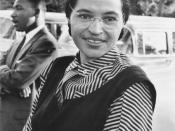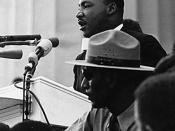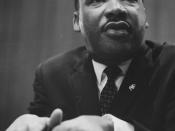Martin Luther King jr. and Jonathan Swift, both persuasive writers and speakers, write for a very similar purpose; they wish to 'free the oppressed.' It is interesting that they induce their audience in practically opposite ways. King condemns the oppressors, spreading the message of hope to the oppressed while Swift uses more of the reverse psychology approach.
In Kings 'I have a dream' speech, because of his diverse audience, he sends out somewhat of a mixed tone. He firmly rebukes those who would treat others unfairly while encouraging and uplifting those who would stand for justice. His speech is strewn with detailed metaphors such as his 'bank of justice', 'vaults of opportunity' and 'bad check' which prove in no uncertain terms that the 'Negro' population has been cheated; the 'manacles of segregation' and the 'chains of discrimination' make obvious his disdain for inequality. When speaking to or about those who would judge others because of the color of their skin, King uses a very accusatory diction in order to challenge his audience to make a change.
King then alludes to the declaration of independence to validate his argument. Finally, King ends his speech with a strong yet compassionate message of hope and freedom. He plainly states that the time is near when the United States will be a land of peace and equality. Then gives a few final examples not only of the simplicity of equality but of the promising outcome. Altogether, King makes a strong argument for his cause.
Swift uses a different yet equally effective approach. He begins his essay, 'A Modest Proposal' not by introducing his proposal but by naming all the atrocities happening in Ireland that would be solved by his proposal. Swift's suggestion is that parents who are unable to support...


